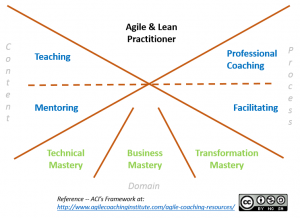[This post is one of many inspired by Agile 2015]
[Update: After reading Johanna Rothman’s comment, a better title for this post would have been “What is Reflective Coaching anyway”.]
The other day I found out that my husband’s definition of what it means “to coach someone” was very different from mine. His was a sports one, i.e. someone who observes and then gives hints what to do differently. It seems to be a popular notion. Last week, Johanna Rothman quoted Consulting Role: Principles and Dynamics of Matching Role to Situation, by Champion, Kiel and McLendon with this definition of a Coaching: “You did well; you can add this next time.”
Mine is different, though and given the high number of coaching related sessions I attended at Agile 2015, I will probably talk a lot about Coaching. Hence it might be good to clarify what I mean, when I use the word.
For starters let me point out that Agile Coaches very often do not actually “coach”. Take this framework by the Agile Coaching Institute:
You’ll notice that Professional Coaching is only 1 of 4 possible activities, next to Teaching, Mentoring and Facilitating. At least in the beginning of an engagement Agile Coaches often have their hands full Teaching and Facilitating and that’s okay. Advice and orientation is often what people need and seek.
In contrast, coaching is the act of creating and “holding” a safe space in which the coachee can find answers in and by themselves.
“Coaching is life-changing – if it is not life-changing it’s not coaching” – Martin Alaimo
For the most part, for me that translates into shutting the fuck up and doing some serious listening. As a coach you don’t have to have all the answers. But you better bring some pretty great questions! Powerful questions for example. Or clean questions.
How about you? What’s your definition of Coaching?

